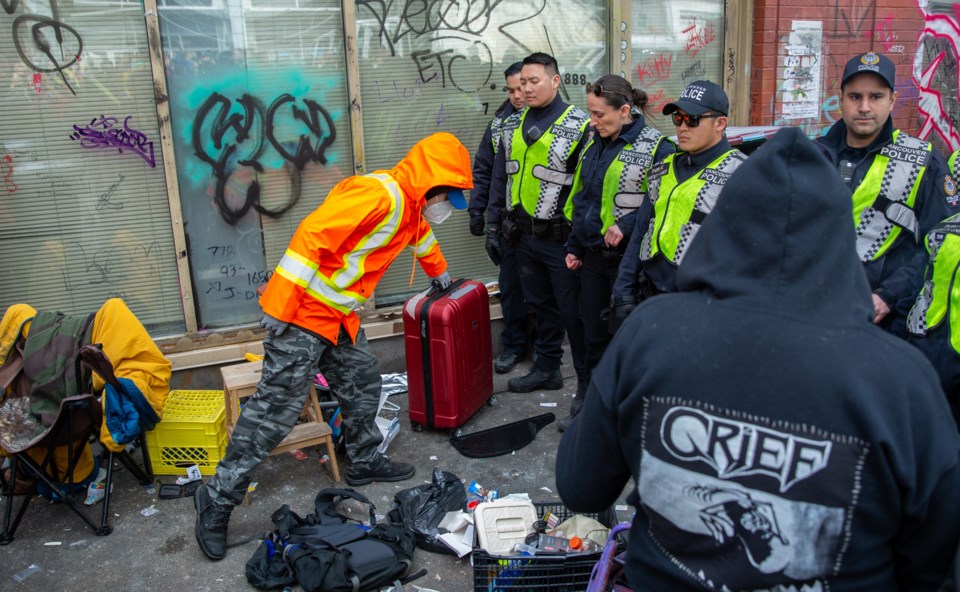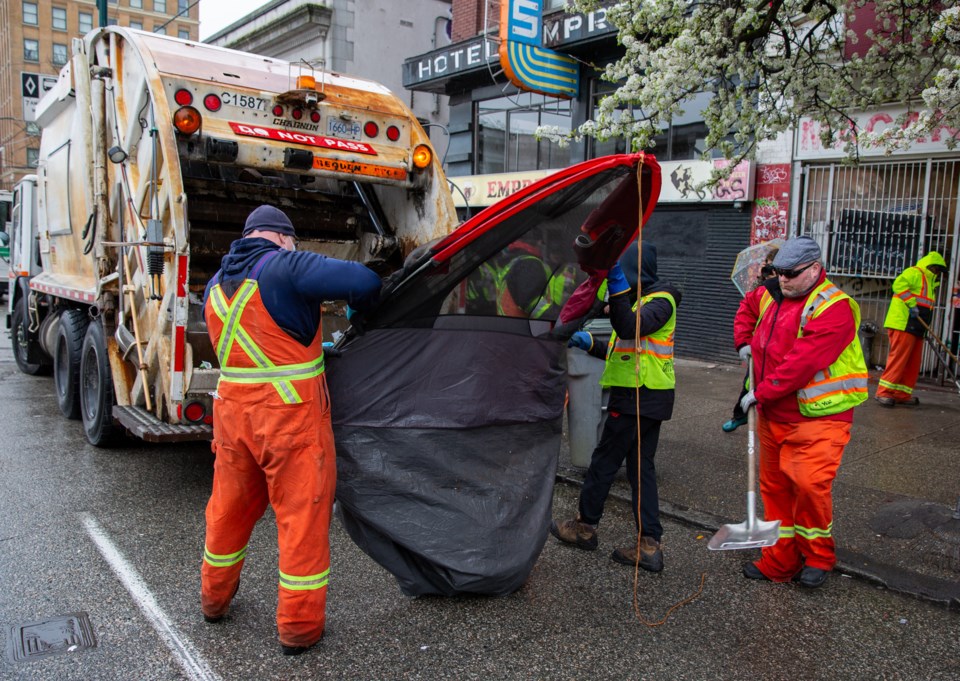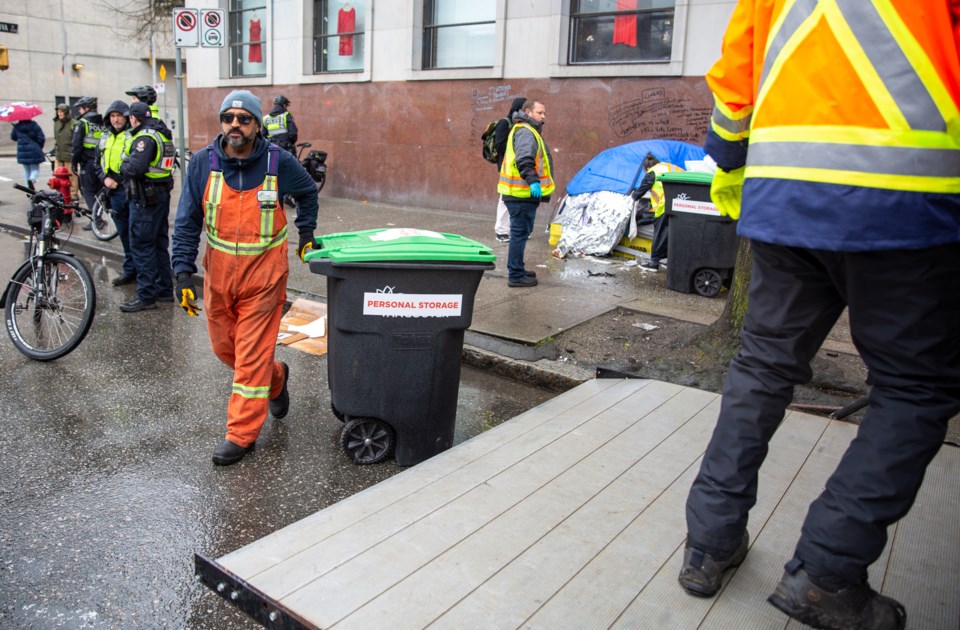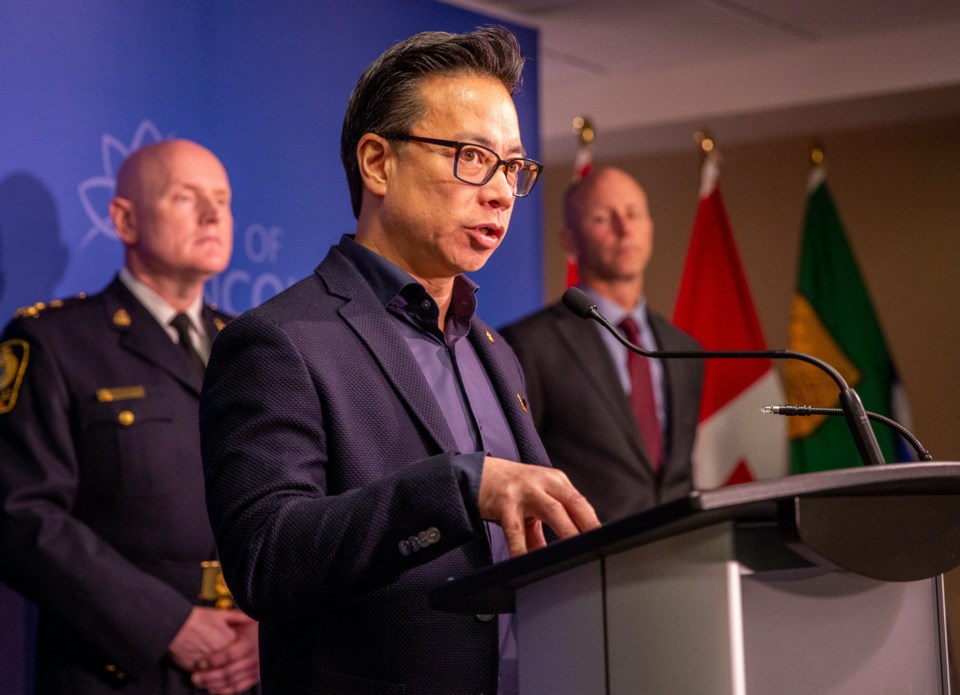The goal of city officials was to dismantle the encampment on East Hastings Street in one day.
That was supposed to happen last Wednesday.
One week later, as Glacier Media observed April 12, tents and structures continue to pop up on the sidewalks along the strip of East Hastings between Gore Avenue and Carrall Street.
The enforcement action that was launched April 5 has clearly reduced the size of the encampment. But questions remain and continue to increase about whether the city-led operation is only displacing people and exacerbating an already tragic situation.
Reporters heard at a news conference last week that city officials couldn’t guarantee the estimated 100 people on the strip could be accommodated in shelters, although only 18 people agreed to go inside as of April 12.
Though the big push last week to end the encampment was unprecedented, the reality is city crews and outreach workers have been somewhat successful in finding homes and shelter for people to go inside since Fire Chief Karen Fry issued her fire order in July 2022.
City statistics supplied April 12 to Glacier Media show that from August 2022 to April 5, more than 600 structures were removed from the area and more than 150 people accepted and moved into housing.
An additional 165 people accepted referrals to shelter.
Mayor Ken Sim said at last week’s news conference at city hall that “a turning point” occurred in the encampment zone and it was time to ramp up enforcement action along the strip.
Was it the right call?
Sim spoke to Glacier Media Tuesday via telephone to answer questions about the action and respond to criticism coming from people such as the BC Human Rights Commissioner and the Office of the Federal Housing Advocate.
The following is a condensed and edited version of the interview.

It has been almost a week since enforcement action was stepped up along East Hastings Street. How would you assess the situation today?
Well, there's so many different ways of looking at it. Have we made progress? Absolutely. At the end of the day, it was about enforcing a fire order because of a threat to public safety — not just for the individuals living in the tents, but for first responders who would respond to tent fires. And buildings surrounding these tents were all at risk of very negative outcomes.
But what do you say to those people who were displaced and had their belongings removed?
Well, a couple of things. First of all, we've taken an empathetic and compassionate approach. That's why it's taken as long as it has. We’ve been storing people's personal belongings. It's important to us that we provide opportunities for that. They're being stored for 30 days, and people can reclaim them at any point in time. And we’ve asked them to come inside. There is still shelter space available for individuals.
We haven't turned away anyone who's needed it and requested it.
City manager Paul Mochrie told reporters last week that the number of people on the street didn’t match the shelter space available.
I don't want to speak for the city manager, but the way I interpreted it was that if everyone requested it, it could be challenging. But here's the reality — we've been asking people for the last eight months to come inside, and people have been turning down shelter space.
On top of that, not all those tents were being lived in by our most vulnerable population. There was a portion of those tents that that were [bicycle] chop shops or scenes of criminal activity. They were just using [the tents] as an opportunity to take advantage of our vulnerable population.
The Office of the Federal Housing Advocate, the BC Human Rights Commissioner and the Hospital Employees’ Union — among others — have all been critical of this action. How do you respond to that criticism?
Everyone has a view. But we had a significant public safety challenge in front of us. Entrenched encampments are not a viable long-term solution to the challenges. We had fires basically on a daily basis. It was actually quite volatile and quite dangerous. So we had to make a call, but it was not done in a knee-jerk reaction.
People have to realize we were working on this for eight months very systematically, and working through it in a compassionate and empathetic way.

You've used the term “compassionate” a few times in this interview and at news conferences. I know people have criticized you for framing the action that way, saying how is it compassionate when people are displaced with no place to go. So when you say compassionate, maybe elaborate on that so people clearly understand what you mean.
We've offered housing, shelter — what have you — to everyone, and everyone who's put up their hand has received it. We've created a storage area, so people do not lose their belongings. And it's also being compassionate and empathetic to everyone else. You have to realize it's not just for the residents living in encampments. It's all the individuals that live in the surrounding buildings, the SROs and other housing who couldn't get around the sidewalks.
Their buildings were actually put at risk [by fire], and they could have been displaced, as well. The level of violence that we were seeing in the encampment was actually pretty extreme. You had crossbow shootings, guns, knives, machetes. Atira Resource Women’s Society did a survey of 50 women in the encampment and found that all had been assaulted, including sexual assault and felt unsafe.
So when we talk about compassion, it’s about having compassion for the entire community, as well.
Before enforcement action ramped up April 5, a city document obtained by the Vancouver Area Network of Drug Users outlined the city’s plan for decampment. The city later confirmed the document was real. In that plan, there is a line that says it “may take several weeks or longer to re-set behaviour.” Can you elaborate on what it means to “re-set behaviour?”
I actually have not seen that quote. So I'd have to dig into that a little bit. It’s my first time hearing of that.
As I interpreted the phrase, it was to stop people from setting up a tent on East Hastings Street.
Without seeing the context of what you're referring to, I can't make a comment on it. But what I can tell you is large, entrenched encampments are not a viable solution to the challenges that we have. If they put public safety at risk, we will be taking them down.
How is it sustainable though? My observations of being on East Hastings Street are that once city crews and police clear a block, people only return to the sidewalks to pitch tents and create makeshift shelters. So how is this sustainable?
What we're going to do is enforce the fire order. Because it's unsafe if we don't. So we're doing it and we will continue to do it.
Any idea how much it's costing?
At this point in time, we don't have a number. But once again, we're talking about public safety here.

You mentioned you’ve visited East Hastings Street since enforcement action escalated April 5. What's the reaction been from people? I’ve heard from people on the street upset with you, and they and others I imagine might have something to say to you about this.
What I've experienced is our city engineers, VPD, Vancouver Fire and Rescue Services — they've all been incredibly positive when I’m walking around the streets, especially in Chinatown. I personally get stopped by it seems like every third person. People in cars are even stopping in traffic, and they're saying ‘thank you.’
People understand that we do have challenges and want to help our most vulnerable population. They want to see movement on things.
So we've approached this in an empathetic way. Like I said, it's taken us a while, but it's the right thing to do. We have to enforce a fire bylaw because, at the end of the day, there was a serious threat to public safety, and we had to address the issue.
Do you have a measurement for success?
We have 330 housing units coming on stream in the next three months. I've been driving by Main and Terminal, and that [modular] housing is getting installed [on city property] as we speak. That's a positive sign. So as we continue to enforce the fire bylaw, and we get more people into housing as it comes on stream, I think you will — knock on wood — start to see a noticeable difference in the area and people get the supports that they need.
Do you see any irony in the fact that both the city-owned Regent and Balmoral hotels, which have an estimated 300 rooms between them but fell into disrepair when owned by a private owner, sit vacant in the heart of the encampment zone?
It would be nice to have as much housing as possible.
OK to sum up, how long is this going to take to reach the city’s goal where there are no tents on East Hastings?
I can't give you an estimate as to how long it will take. But what I can tell you is we're not letting up. So we will continue from a public safety perspective to enforce the fire order — so we reduce the risk of fires, not only in those structures, but in the surrounding buildings where people live.
Anything else you wanted to share?
A couple of things. One I’ve already mentioned is that every person who put up their hand for shelter, got it. The second thing is, I know there will be critics and we actually welcome their thoughts. I think that makes for better solutions. For the critics, I would just ask them, ‘Given the situation that we’re dealt with, what would they do differently?’
And don't talk about a situation where everything's perfect, and you have all these things all at once. Deal with all the current realities of what we’re dealing with. How would you navigate this one? We don't live in a perfect world where you have all the wraparound services, you have perfect locations everywhere.
What would they do in the real world, knowing that we have a significant risk to public safety as it relates to fires — and all the other challenges that we had in the encampment as it relates to public safety? What would they do?
Note: The city’s communications department sent Glacier Media an update on statistics collected regarding enforcement action on East Hastings after the interview with the mayor. A story containing that information can be read here.





